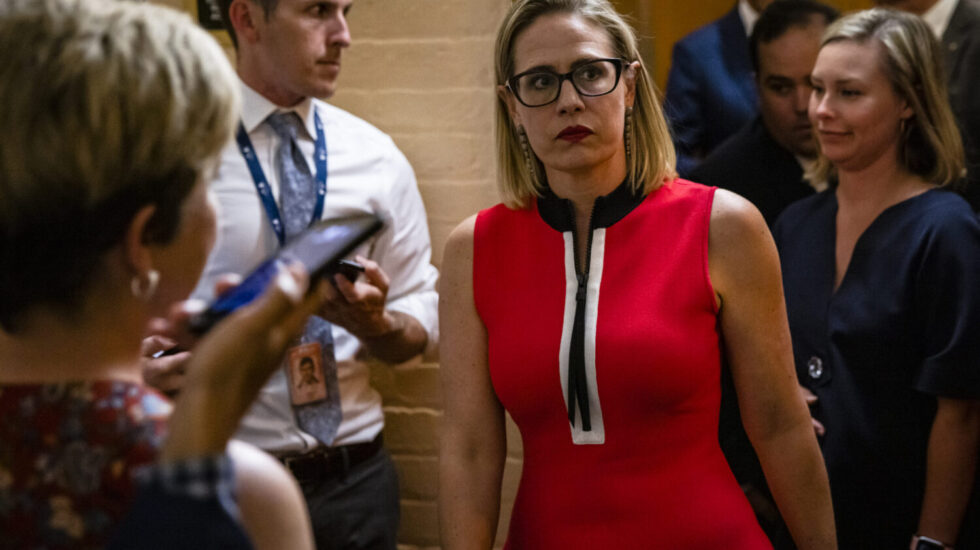Who will blink first – progressives in the House or Senators Joe Manchin and Kyrsten Sinema?
That’s the question in Washington, D.C. this week as President Joe Biden’s economic agenda hangs in the balance.
Here’s the state of play:
- The House will vote Thursday on a $1.2 trillion dollar infrastructure bill that passed the Senate in August and invests in the nation’s roads, water systems, public transportation, and broadband, among other initiatives. House Progressives, citing a promise made by Speaker Nancy Pelosi (D-CA), say they won’t vote for the bill unless Congress first passes a much larger package that funds liberal priorities like universal pre-k, free community college, paid family leave, climate mitigation, and expanded Medicare.
- “This has been our position for more than three months. We’re not bluffing — and it’s because we’re ready to deliver child care, health care, paid leave, climate action, and more to people across America,” tweeted Rep. Pramila Jayapal (D-WA), the chair of Congressional Progressive Caucus on Tuesday night.
- “This agenda is not some fringe wish list: it is the president’s agenda, the Democratic agenda, and what we all promised voters when they delivered us the House, Senate, and White House,” Jayapal added in a statement.
- Progressive standard bearer Bernie Sanders, the independent Senator from Vermont, urged House progressives to stay committed to their demands, tweeting Tuesday “I strongly urge my House colleagues to vote against the bipartisan infrastructure bill until Congress passes a strong reconciliation bill.”
- In a statement, Sanders added, “If the bipartisan infrastructure bill is passed on its own on Thursday, this will be in violation of an agreement that was reached within the Democratic Caucus in Congress. More importantly, it will end all leverage that we have to pass a major reconciliation bill.”
- The White House and the vast majority of Democratic lawmakers in Congress support the larger package – stuffed into a single reconciliation bill – but Senators Manchin (D-WV) and Sinema (D-AZ) have expressed concern about its $3.5 trillion dollar price tag.
- Biden and his staff met with Sinema three times on Tuesday to try and bring her into the hold (Sinema also met with business groups that oppose the bill). Manchin, too, had a White House meeting. The talks yielded “some progress.” Biden cancelled at trip to Chicago in order to stay involved in the discussions.
- Democrats are frustrated with Sinema, in particular, because she hasn’t clearly identified her specific issues with the bill (reports indicate that she’s concerned about a corporate tax rate it includes). Manchin has also been hard to pin down, although he’s said the Medicare expansion goes too far and he thinks a $150 billion clean energy program included in the package offers unnecessary incentives to large companies. West Virginia, Manchin’s home state, leads the nation in underground coal production.
- “I and others are waiting for Kyrsten and Joe to tell us what is it that they like or don’t like, and then we can get it done, because other people have been waiting for all these programmatic areas of support for a long time,” said Sen. Mazie Hirono (D-HI).
- One potential compromise has emerged in recent days. If Manchin and Sinema commit to a framework for the larger spending package and agree to a top line number, then House Progressives might be willing to pass the infrastructure bill first.
- “I think what we need right now is a number from the Senate,” said Rep. Richard Neal, (D-MA) who chairs the tax-writing Ways and Means Committee. “We did our part in markup. We have a plan. It’s been well met.”
- Rep. Ro Khanna (D-CA) added, “We just need to get a number right? The House is going to be unified. We need to get one number from one senator, and I think we got to make it very clear that that’s holding everything back.”
- On CNN, Khanna, a member of the Congressional Progressive Caucus, had a more pointed view, saying, “One Senator, Kyrsten Sinema, is holding up the will of the entire Democratic Party.”
- Thursday’s planned vote on the infrastructure bill could always be postponed until an agreement on the reconciliation package is reached, but Pelosi has promised House moderates – who are resentful that progressives are holding infrastructure spending hostage – that the bill would appear on the floor by the end of September. If she delays the vote, moderates might pull their support.
- “Man, holding one hostage over the other is not fair — it’s not right, it’s not good for the country,” Manchin said Tuesday, echoing the position of centrist Democrats in the House. “You have to have trust a little bit, you know. Everybody’s not going to get what they want.”
- House moderate are gambling that they can attract enough GOP support in the lower chamber to compensate for a progressive revolt.
- “Everybody’s waiting for Pelosi to pick another rabbit out of the hat. So we’ll see,” Rep. Jimmy Gomez (D-CA) said.
- “We will pass both bills,” Pelosi said after a Tuesday meeting with her caucus.
- Meanwhile, Congress is rapidly approaching two deadlines with massive economic ramifications. It must pass a stopgap spending measure to keep the government funded after the Sept. 30 end of the fiscal year, and it must raise the debt ceiling by the middle of October to prevent the U.S. from defaulting, an unprecedented event that could tank markets and spur widespread unemployment.
- Rep. Emanuel Cleaver (D-MO) warns, “If we fail, Joe Biden and his administration is in jeopardy because he campaigned on this and people voted for him.”



